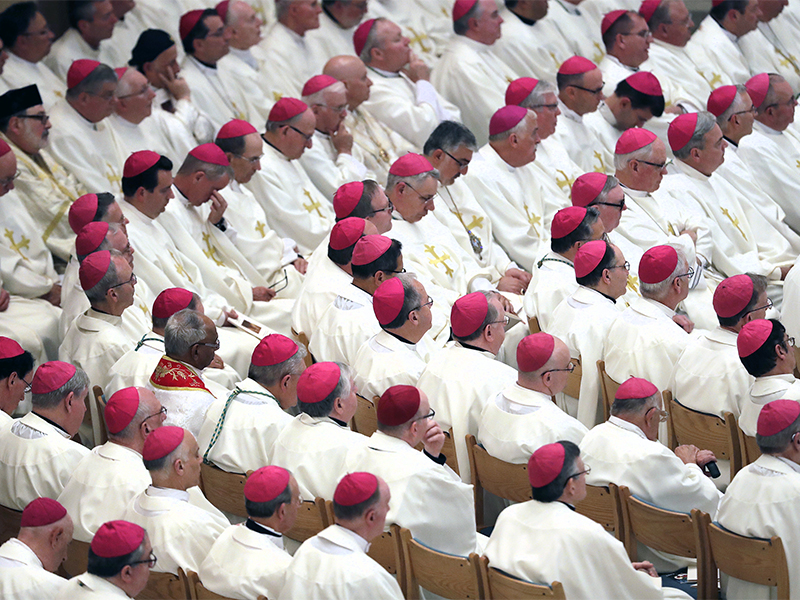
As RNS readers will know, a week ago the U.S. Conference of Catholic Bishop filed a brief with the Supreme Court that supports the right of public sector unions to operate with a closed shop.
Waking up from a 20-year nap, Father Rip Fitz Winkle hit the snooze button. “The bishops are backing labor unions?” he said. “They’ve been doing that since the days of Good Pope Leo. Tell me something I don’t know.”
“What you don’t know, Father, is that over the past couple of decades the bishops have drifted rightward, downplaying traditional Catholic social teaching to such a degree that they sometimes sound like the Republican Party at prayer. Why, they even opposed extending health coverage to millions of uninsured Americans because it would require some faith-based nonprofits to tell the government they don’t want to provide free contraceptive services to their female employees.”
“So you’re telling me that the bishops have actually come out against unions?” Rip asked.
“No, not that. And they haven’t embraced the death penalty or the deportation of illegal immigrants either. But when it comes to economic policy, they’ve been missing in action. That’s why the brief they filed in Janus v. American Federation of State, County, and Municipal Employees is news.”
“OK, I’m awake.”
In fact, the bishops begin their brief with Good Pope Leo—Leo XIII’s 1891 encyclical Rerum Novarum (Of New Things), which put the Church solidly behind unions as essential to defending workers’ rights. And they go on to make clear that in backing organized labor, they have long opposed what’s known as “right-to-work” laws.
Those laws, which were allowed at the state level by the 1947 Taft-Hartley Act, let employees decline to join a union while working in a union shop. They thus can be “free riders”—receiving the benefits of membership without having to pay the dues.
What Janus v. AFSCME would do is make right-to-work a constitutional right—barring public unions everywhere in the country from requiring membership. And if such a right is established for public unions, can private ones be far behind?
The bishops point out that allowing free riders “dramatically weakens” unions and, “in turn, their bargaining power on behalf of workers, as experience in ‘right-to-work’ states has borne out.” The closed shop is, they recognize, “a necessary concomitant of the right of workers to organize and bargain collectively.”
It is telling that the bishops’ usual allies in religious liberty cases, the Becket Fund for Religious Liberty and the American Center for Law and Justice, have filed briefs on behalf of right-to-work—but not on religious liberty grounds, because there aren’t any.
As the bishops point out, there’s a long-standing exemption for any employee whose religious beliefs keep her from joining a union. It’s an exemption that solves the free-rider problem by requiring her to contribute the amount she would have paid in dues to a charitable cause.
Instead, joining the parade of right-wing amici eager to destroy organized labor, Becket and ACLJ contend that making someone join a union involves “compelled speech”—on the grounds that the union’s political activities, up to and including involvement in electoral campaigns, unconstitutionally requires members to contribute to causes they may not personally support.
Of course, there are various situations where compelled speech has been deemed lawful —from filling out your tax returns to mandatory student fees that support groups with which some students might disagree.
The bishops’ most striking argument is based on their unhappiness with the Court’s finding a constitutional right to abortion in Roe v. Wade and to same-sex marriage in Obergefell. In both cases, they say, the decision “marginalizes” their voices “with respect to an important public policy debate by declaring their position to lie beyond the constitutional pale.”
The same would be the case if the closed shop were constitutionally forbidden. Now there’s an argument for the conservatives on the Court to reckon with.
Ultimately, the bishops take their stand on the crucial importance to civil society of voluntary associations, whether they be unions or, indeed, the Church itself. Without them, society would become “less diverse, less vibrant, and so less capable of withstanding overweening powers—whether of the market or of the state—that may threaten the dignity of the person.”
The irony, they say, is that “a misguided effort to protect one individual” from government coercion would leave only individuals to stand against government (or economic coercion.” Boom!
So what led the bishops to abandon their recent diffidence and stand up for workers against the powers-that-be? That’s for insiders to know and you to find out.
But I’ll tell you this: The tectonic plates are shifting at the Bishops Conference. And if Pope Francis lives long enough to appoint another few dozen bishops, they’re going to shift a lot more.






